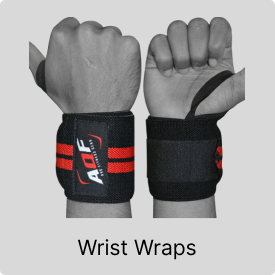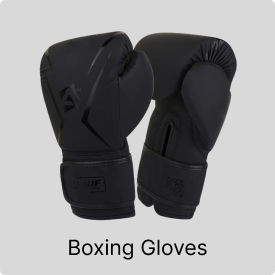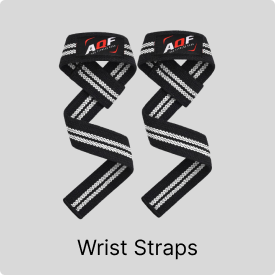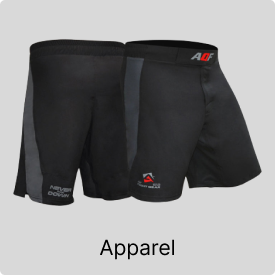10 Common Summer Workout Mistakes To Avoid
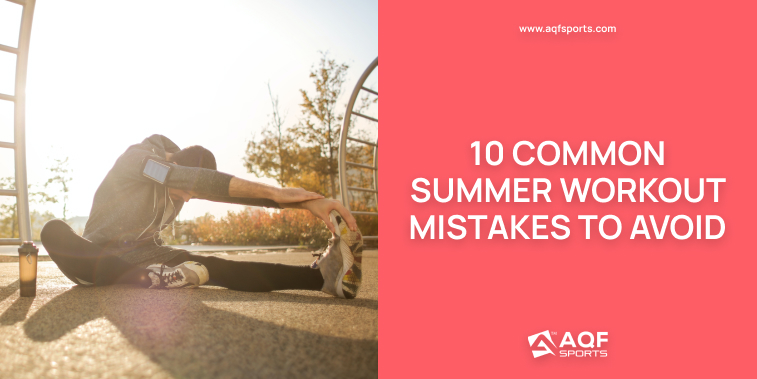
Maintaining a proper workout routine year-round is crucial for leading a healthy lifestyle. Whether you’re a dedicated runner, athlete, swimmer, or yogi, it’s important to be aware of summer workouts’ potential risks. Summer workout mistakes are common even among expert trainers. However, you can avoid overexertion and heat stress by avoiding the following summer workout mistakes.
The Scientific Truth Behind Summer Workout Challenges
Summer workout presents specific challenges that impact your performance and overall well-being. Understanding these challenges from a scientific standpoint helps in optimising your workouts and mitigating potential risks.
Heat stress and thermoregulation:
High temperature puts your body’s thermoregulatory system under stress. Summer exercises raise core body temperature more than usual and induce rapid sweating to dissipate the extra heat. However, in hot and humid conditions, evaporation efficiently cools down your body. [1] . As a result, it causes fatigue and reduces your exercise capacity. In fact, you are at a higher risk of catching heat-related illnesses [2].
Hydration and fluid balance:
Intense sweating causes body fluid loss and potential dehydration. Proper hydration is critical for your health. Studies suggest that mild dehydration [3] impairs cognitive function, increases perceived exertion, and compromises exercise performance. Increase your fluid intake before, during, and after exercise to replace lost fluids and electrolytes. [4]
Cardiovascular strain:
Hot weather workout strains your cardiovascular performance due to increased thermoregulation. Your brain signals your heart to redirect blood flow from muscles to the skin for cooling. As a result, blood flow to muscles decreases, leading to exercise inefficiency, less endurance, and lower strength. [5]
Respiratory challenges:
High temperatures and humidity affect the respiratory system causing difficulty in breathing during workouts. Inhaling hot and humid air impairs lung function, increases respiratory rate, and elevates workout exertion. It limits your exercise performance and contributes to discomfort during summer workouts.
Common Summer Workout Mistakes to Avoid:
So, what can you do to protect yourself from summer workout challenges? Luckily, it all boils down to avoiding some common summer workout mistakes and being mindful of your body’s signals. Most summer workout challenges are due to the following mistakes:
#1 You Are Not Used To The Summer Heat:
Working out in hot weather affects your body differently than working out in normal weather. Summer heat raises body temperature faster and leads to fatigue quicker than usual. Your body will need 7-14 days to adapt to the heat for an easier workout in warmer weather.
#2 You Are Not Drinking Enough Water:
Sweating leads to salt loss, and it is vital to replenish fluids in your body. Hydrate before, during, and after your workout. Don’t wait until you feel thirsty to drink water. Ideally, drink some water after every 15 minutes.
#3 You Are Not Eating Proper Meals:
Proper nutrition provides the energy needed for an effective workout. Prepare and eat a nutritious meal several hours before exercising. When you cool down, hydrate with coconut water or your favourite sports drink. Eat within 30 minutes post-workout to aid muscle recovery.
#4 You Wear the Wrong Clothing:
There is a common misconception that layering or wearing heavy clothes induces more sweating for a more effective workout. In fact, improper clothing leads to heat exhaustion. Wear light and breathable gym clothes like tank tops and shorts for rapid sweat evaporation. Wear loose-fitting light-coloured clothing that reflects the summer heat.
#5 You Are Neglecting Sun Protection:
Protect your skin from harmful UV rays. Apply sunscreen before your workout and reapply as needed. Dermatologists recommend Reapplying sunscreen after every 2 hours. Use sweat-resistant or sports-specific sunscreen.
#6 You are Overexerting Your Body:
Adjust your workout intensity to account for the heat. Start with moderate exercise and modify your routine by reducing reps, shortening the workout duration, or slowing your pace. Listen to your body and set goals. Gradually increase workout intensity to regain your normal workout level.
#7 You Are Not Scheduling Your Workout Poorly:
Avoid exercising directly under the sun. During midday, the temperatures and humidity are highest. If you must exercise during this time, do your workout in proper air conditioning. Otherwise, early morning or late evening workouts under shade are recommended during summer.
#8 You Are Not Giving Your Body Enough Time to Recover Post Workout:
Recovery is just as important as the workout itself. Neglecting proper post-workout causes muscle soreness, fatigue, and increased injury risk. Incorporate adequate rest, stretching, and foam rolling into your routine to speed up muscle repair and reduce muscle and tendon injuries.
#9 You Skip Warm-Up:
Warm-up exercises prepare your body for demanding summer workouts. When you skip the warm-up, you increase your chances of spraining your muscles and other injuries. Perform dynamic stretching for at least 5-10 minutes. Start with light cardio, and warm-up mobility exercises before diving into your main workout.
#10 You Are Not Maintaining Proper Form and Technique:
Proper form and technique maximize workout effectiveness. When performing exercises incorrectly, you may not be targeting the intended muscles or overloading certain joints, leading to imbalances and potential harm. Focus on maintaining good posture, engaging the correct muscles, and seeking guidance from a qualified trainer.
Summer Workout Do’s and Dont’s
Do’s
- Stay hydrated with coconut water and electrolyte-rich beverages.
- Apply sunscreen, wear a hat, and wear sunglasses to protect your eyes.
- Start with dynamic warm-up stretches and end with static cool-down stretches.
- Wear moisture-wicking, light colour clothing and suitable footwear.
- Schedule workouts during cooler parts of the day.
- Listen to your body and adjust the workout intensity accordingly.
- Choose shaded or well-ventilated areas for workouts.
- Watch for signs of heat exhaustion and take breaks if needed.
- Take proper rest and recovery between workouts.
Don’ts
- Don’t put too much stress on yourself
- Don’t try to follow the same workout during the summer
- Don’t wear warm clothing or a layer of clothing
- Don’t workout directly under the sun or during midday
Summer Workout Mistakes – FAQs
Why is it harder to work out in the summer?
Working out in summer is more challenging due to more heat and humidity which leads to fatigue, dehydration, and a higher heat-related illness risk.
What are the disadvantages of the gym in summer?
The disadvantages of going to the gym in summer are limited access to fresh air, overcrowding, and difficulty in regulating body temperature during intense workouts. Choose air-conditioned gyms for summer workouts.
Why am I leaner in summer?
You may appear leaner in summer due to increased perspiration and water loss, which temporarily reduce water weight and bloating.
Why can’t I exercise in hot weather?
Exercising in hot weather strains the body’s thermoregulation system. It raises your heart rate, increases fatigue, and puts you at a greater risk of getting heat-related illnesses such as heat exhaustion or heat stroke.
What temperature is too hot for exercise?
Generally, temperatures above 90°F (32°C) or a heat index exceeding 100°F (38°C) is high-risk for exercise.
Is it safe to exercise in 30-degree heat?
Exercising in 30-degree heat (Celsius) can be safe if you take proper precautions, such as staying hydrated, exercising during cooler times of the day, wearing appropriate clothing, and listening to your body’s signals. However, consider your tolerance, fitness level, and any underlying health conditions before engaging in intense physical activity in the summer.
The Bottom Line
Summer workouts present challenges due to increased heat and humidity. Hot weather impacts your performance and increases dehydration and heat-related illness risks. The key to doing a proper workout during summer is to stay hydrated, exercise during cooler times, wear appropriate clothing, and listen to your body’s signals to optimize your workouts. Stay safe and make the most of your summer fitness routine.
Suggested Reads:
- 30-Minute Cardio Workout at Home
- 13 Mini Resistance Bands Exercises for Beginners
- 19 Gym Essentials Every Fitness Lover Needs
References:
[1] Research, I. of M. (US) C. on M. N., & Marriott, B. M. (1993). Physiological Responses to Exercise in the Heat. Www.ncbi.nlm.nih.gov; National Academies Press (US). https://www.ncbi.nlm.nih.gov/books/NBK236240
[2] Khan, A. (2019). Heat-related illnesses. Review of an ongoing challenge. Saudi Medical Journal, 40(12), 1195–1201. https://doi.org/10.15537/smj.2019.12.24727
[3] Zhang, N., Du, S. M., Zhang, J. F., & Ma, G. S. (2019). Effects of Dehydration and Rehydration on Cognitive Performance and Mood among Male College Students in Cangzhou, China: A Self-Controlled Trial. International Journal of Environmental Research and Public Health, 16(11). https://doi.org/10.3390/ijerph16111891
[4] Maughan, R. J. (1991). Fluid and electrolyte loss and replacement in exercise. Journal of Sports Sciences, 9 Spec No(1), 117–142. https://doi.org/10.1080/02640419108729870
[5] González-Alonso, J., Crandall, C. G., & Johnson, J. M. (2008). The cardiovascular challenge of exercising in the heat. The Journal of Physiology, 586(1), 45–53. https://doi.org/10.1113/jphysiol.2007.142158
Image Source: Shutterstock

